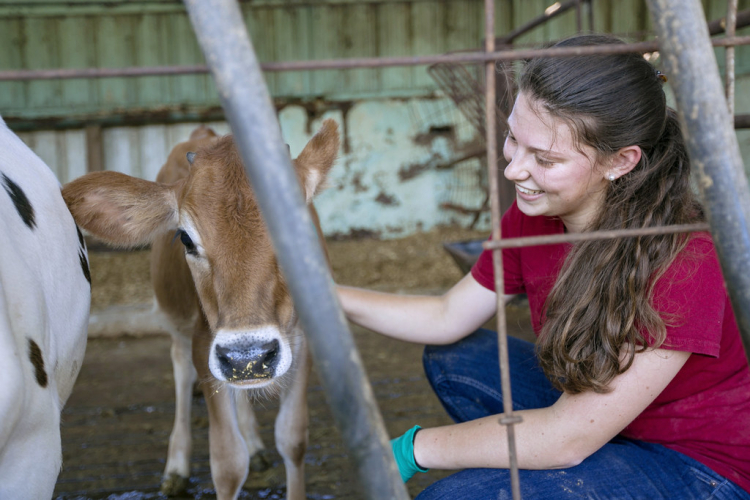The Death Of The Dairy Industry

Walking down the aisles of a 21st-century supermarket, one can notice a vast availability of foods accommodating every dietary need, ranging from plant-based to gluten-free or simply low-fat products. In this modern era, society is becoming more conscientious about what is being put into our bodies and how food production is affecting Planet Earth. But why has this sudden urge for vegetarian, vegan and dairy-free goods taken the world by storm? Could social media and the internet be behind this reduction in dairy consumption and our increasing environmental awareness?
As the popularity of plant-based products skyrockets, recent statistics indicate that the dairy industry has seen a noticeable decrease in its consumption levels. Back in 2018, Dairy Farmers of America (DFA) announced a loss of $1.1 million in sales, while the sale of dairy-free options rose to $3.3 million, constituting 15 percent of milk sales. Although these numbers may not seem impressive in comparison to regular cow-milk sales, it is important to keep in mind the capitalist grip dairy production has long had on human civilization. “The plethora of new dairy alternatives definitely deserves credit for the fall of the dairy industry. We now have almond, oat, pea, coconut, cashew and soy milks — and that’s just the beginning,” commented Chloe Lyons, president of the Vegan Club at AUP.
Despite the fact that many of these plant-based and dairy-free alternatives possess the vitamins your body needs without the high levels of saturated fat found in dairy products, those in charge of marketing for the dairy industry insist on the sole consumption of animal milk as necessary for your bone and general health. “The same way that we do not need goat milk, dog milk, horse milk or any other mammal’s milk for nutrients, we do not need cow milk. There is nothing you can find in an animal product-based diet that you cannot find in a safer way somewhere else," countered Lyons.
Indeed, certain studies have disproved the necessity for regular dairy products as a means of increasing health stability. Not only has it been concluded that 65 percent of the population is lactose intolerant, but a 12 year-study has also proven that those who consume high servings of milk are more likely to be afflicted by bone and hip fractures than those who don’t.
While the consumption of dairy has been immediately linked to health issues, it is not solely us people that feel the negative effects of the dairy industry — the Earth is also at stake. The production of dairy generates a percentage of agriculture’s greenhouse gas emissions due to the quantity of water it takes to produce. ”[Abandoning dairy] is the biggest thing you can do to lower your carbon footprint as an individual, and people are starting to understand the impact of that,” stated Alex Lane, member of the AUP Vegan Club. This also goes hand in hand with protecting livestock, the welfare of which is another concern for many vegans.
When it comes to ensuring the wellbeing of ourselves and the planet, all of this is crucial information that must be passed down to future generations. But the question of how we have realized dairy is not what it seems remains unanswered. How have the vegan and plant-based movements become so widely known?
Perhaps the biggest aid has been the growing role of digital media. Social media influences how we choose to live our lives as it becomes an increasingly inseparable part of today's culture. “Social media has, with the portrayals of the climate crisis, pushed veganism and vegetarianism forward. There are now more ads for vegan products as well as facts and statistics on how your food choices can have an impact,” commented Lane.
Veganism and going dairy-free are trendy movements that have gathered immense followings online, particularly among younger people who will promote them on their accounts. In this way, social media acts as an outlet for millenials and members of Generation Z to encourage conscious consumption, allowing veganism to thrive in a way it was never able to before. Given that younger people will be hit hardest by the continuation of global warming, there is immediate reason for them to get involved and take action now.
Every day, more people become vegans, vegetarians or simply decide to leave cow-milk behind for plant-based products. “As the world starts to see the ethical, health, and environmental consequences of dairy consumption while alternatives are becoming more widely available, I think it will be impossible for the dairy industry to continue. We are just at the beginning,” asserted Lyons. Although the dairy industry still remains powerful, society is becoming more aware of its detriments each day. Therefore, its possible impending demise and the increasing popularity of plant-based products come as no surprise. Instead, these trends serve as proof that young people will not stand idly by in the face of dangers to their health, the safety of animals or the longevity of their planet.







